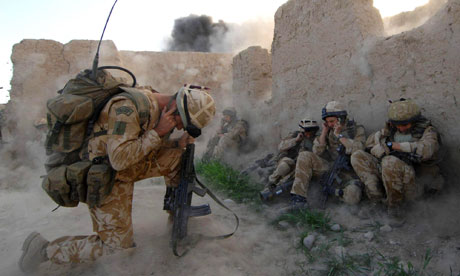Monday 3 January 2011 18.22 GMT
- Article history

Afghan and western officials are pinning their hopes on a tribal uprising to bring peace to the notoriously violent district of Sangin just three months after the UK left a town that had become a death trap for British troops.
The Taliban stronghold has been bitterly contested by insurgents and drug traffickers ever since British troops arrived in 2006, but today the government revealed that tribal elders, backed by some local insurgents, have agreed to stand up to the Taliban.
It was also announced that that one group of insurgents have already handed in their weapons in an attempt to join a local peace process in Sangin.
Under the arrangement, local Taliban fighters will stop attacking US and Afghan forces and will keep non-local insurgents out of the Sarwan-Qala area of the upper Sangin Valley, according to a spokesman for the Helmand governor Gulab Mangal.
Foot patrols by government forces will continue and local people will be expected to help clear areas of homemade bombs and tip off local police as to their whereabouts.
"There was no signed agreement but we believe this will create the opportunity for other Taliban fighters to come and join the government," said Daoud Ahmadi.
He said that the Afghan army, police and US forces were all represented at the traditional tribal shura last Saturday and that some of the tribal elders had been given authority by the local Taliban to speak on their behalf.
The elders were members of the Alikozai tribe, the largest single tribe in the district. The Taliban crushed a previous Alokozai uprising against them in 2007 which failed largely due to the lack of support from Nato forces and the government.
Major General Richard Mills, whose US Marines took charge of Sangin from the British in September, said this time the elders would be able to resist the Taliban.
"The insurgents have already begun to strike back savagely at those who desire peace but so far the elders remain steadfast," Mills said.
The architects of the Nato strategy in Afghanistan have long hoped that they might be able to replicate the sort of "tribal awakening" that benefitted US forces in Iraq, although a previous arrangement with the Shinwari tribe in the east of the country ended in failure.
A spokeswoman for the US-led International Security Assistance Force said that coalition was "cautiously optimistic" about the Sangin deal but were reluctant to "overblow" its importance.
"It's to be welcomed because this has been an initiative that originated not from us but from locals who decided that it was in their best interest to support their local government," she said. "Is it going to be a sustainable bit of progress? We don't know."
Separately officials in Helmand said that a group of eight insurgents from Sangin had surrendered their weapons to the government and joined a local peace process.
The group, led by Mullah Abdul Bari, gave up weapons including a rocket and four machine guns.
In a statement Mangal's office said that eleven other insurgents have announced they will stop fighting in the town of Musa Qala "because they know that they cannot win". It also said that a group of six insurgents had joined the side of the government in the district of Marjah, scene of a major operation by Nato forces early last year.
Even before Mangal took up his position in Helmand in 2008 he made clear his determination to reach out to insurgent groups but until recently has had little to show for his efforts.
But locals in Helmand did not think that the defection of Abdul Bari's group was a significant setback for the Taliban.

No comments:
Post a Comment